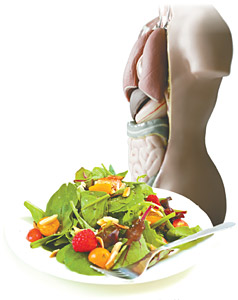One of the most important aspects of targeting chronic disease is the health and vitality of the gastrointestinal tract. A vast array of chronic diseases ranging from cardiovascular, auto-immune, musculoskeletal, gastrointestinal, and gynecological can be rooted in the dysfunction of the digestive system.
Traditional Chinese Medicine views the health of the Spleen and Stomach qi as the root of long term health and stresses the underlying importance of the Spleen and Stomach in all chronic disease states. Therefore it is incumbent upon practitioners to identify and treat dysfunction and imbalance in the gastrointestinal system in all chronic recalcitrant conditions. I am however often shocked to see qualified practitioners of traditional Chinese medicine resort to naturopathic remedies to treat gastrointestinal issues in an allopathic manner completely disregarding the differential diagnosis of traditional Chinese medicine. I would like to discuss some important basic considerations for practitioners of Traditional Chinese Medicine to keep in mind when seeking to heal a gastrointestinal imbalance.
Traditional Chinese Medicine has much to offer without having to resort to standard naturopathic supplementation. As a practitioner of Traditional Chinese Medicine, I feel it is crucial to adequately treat the patient within this diagnostic paradigm before resorting to remedies technically outside the scope of practice for most practitioners of Traditional Chinese Medicine.
 The three most elemental patterns to address in all chronic gastrointestinal disease states are as follows: Liver Depression Qi Stagnation, Spleen / Stomach Qi Vacuity, and Damp Heat. Various other patterns spiral off from these three basic pathologies such as Food Stagnation, Blood Stagnation, Blood and Yin Vacuity and Phlegm.
The three most elemental patterns to address in all chronic gastrointestinal disease states are as follows: Liver Depression Qi Stagnation, Spleen / Stomach Qi Vacuity, and Damp Heat. Various other patterns spiral off from these three basic pathologies such as Food Stagnation, Blood Stagnation, Blood and Yin Vacuity and Phlegm.
There are a multitude of herbal formulas which target these three main pathologies, however some basic dietary considerations are important to address as well. In Liver Depression Qi Stagnation, it is crucial to have the patients eat larger meals earlier in the day concentrating on a diet free from processed foods. The patient must identify food allergies/sensitivities and should avoid skipping meals, eating while upset, eating too quickly or eating while driving or watching television. The patient should also avoid skipping meals and make a conscious effort to eat slowly. The diet should be geared toward a high vegetable low carbohydrate, low meat diet. Small amounts of light spices with mild dispersing and or sour flavors are helpful as well. Foods to avoid are high saturated fats, excessive hot and pungent flavors, and excessive cold and raw foods.
Important considerations for Spleen qi and stomach qi vacuity are as follows: identifying food allergies, eating main meals before 6 p.m., lightly steaming or stir frying all vegetables, using long slow cooking methods, emphasizing soups and stews, focusing on simple food combinations, eating meals at regular times, avoiding excessive fluids with meals, avoid skipping meals, avoiding excessive dairy, raw / cold foods, nut butters, processed sugars and alcohol. Important considerations for Damp Heart include all the aforementioned recommendations for Spleen/Stomach qi vacuity as well as avoiding all fried foods and excessive animal proteins as well as excessive oil consumption.
The most important TCM formulas to target the pathologies of Liver Depression Qi Stagnation, Spleen/Stomach qi Vacuity and Damp Heat are as follows: Xiao Chai Hu Tang, Xiao Yao san, Dan Zhi Xiao Yao San, Ban Xia Xie Xin Tang, Bu Zhong Yi Qi Tang, Xiang Sha Liu Jun Zi Tang, Si Ni San, Si Jun Zi Tang and Wu Mei Wan. These formulas should be modified as per patient presentation. However it is possible to combine patent medicines in an intelligent manner if patients are not compliant with teas or powdered extracts. In particular, the formula Bu Zhong YI Qi Tang can be modified almost indefinitely to effectively target chronic and complex gastrointestinal presentations. The three medicinals Huang qi, Ren Shen, and Zhi Gan Cao are extremely effective at healing the mucosa of the small intestine and large intestine and the practitioner can modify these medicinals as needed to focus on particular issues with each unique patient presentation. The combination of the medicinals Bai zhu and Chai Hu are particularly important for clearing Damp Heat. The medicinals Sheng Ma and Chen Pi effectively disperse and lift the Spleen and Stomach qi and efficiently prevent stagnation and the tendency for Damp to drag the qi mechanism down.
The formula Bu Zhong Yi Qi Tang can be modified to address Food stagnation by adding Fo Shou, Gu Ya, Mai Ya, and Shan Zha. To address Damp Heat add Huang Bai and Huo Xiang. To address more significant Liver Depression add Yu Jin and Sha Ren. To address Blood Stagnation add Chuan Xiong and Mu Dan Pi. To address Blood / Yin vacuity add Sheng Di Huang and Er zhi Wan. To address Phlegm add La fu Zi and Ban Xia. These are just some sample modifications.
The practitioner must modify intelligently and accordingly to address each patient's unique pattern presentation. In the next part of this article, we will explore ways to integrate vitamins and supplements into a TCM treatment protocol for chronic presentations with significant gastrointestinal complications. However, it is important to remember that TCM can serve as a stand –alone system of therapy as long as the practitioner and patient work effectively to eliminate food allergies and formulate patient specific dietary protocols.
Click here for more information about Craig Williams, LAc, AHG.




